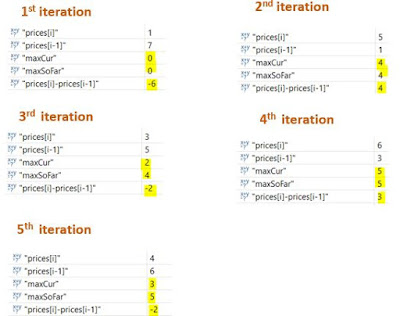Problem Statement
Say you have an array for which the ith element is the price of a given stock on day i.
If you were only permitted to complete at most one transaction (ie, buy one and sell one share of the stock), design an algorithm to find the maximum profit.
Link to GitHub :Code
Link to GitHub :Code
Example 1
Input: [7, 1, 5, 3, 6, 4] Output: 5 max. difference = 6-1 = 5 (not 7-1 = 6, as selling price needs to be larger
than buying price)
Example 2
Input: [7, 6, 4, 3, 1] Output: 0 In this case, no transaction is done, i.e. max profit = 0
Solution
- We need 2 variables maxcur and maxsoFar.
- maxCur keeps on adding 2 consecutive stock price
- maxCur would then compare value with maxsoFar.
- When we reach end of the array we would get maxsoFar
public static int get(int [] prices){ int maxSoFar=0, maxCur=0; //We need to start getting the difference from the second and
//first element in the array and // keep incrementing i for(int i=1;i<=prices.length-1;i++) { //gets the current max maxCur=Math.max(0, maxCur+=prices[i]-prices[i-1]); //gets the max so far maxSoFar=Math.max(maxCur, maxSoFar); } return maxSoFar; }
Iteration
Time Complexity O(n)^2 Space Complexity 0(1)
stocks=[7,1,5,2,4] def buy_sell_once(s): maxprofit=0 #first loop for i in range(len(s)-1): for j in range(i+1,len(s)): if s[j] - s[i] > maxprofit: maxprofit=s[j] - s[i] return maxprofit m=buy_sell_once(stocks) print(m)
Time Complexity O(n) Space Complexity 0(1)
1 2 3 4 5 6 7 8 9 10 11 12 | stocks =[7,1,5,2,4] def buy_sell_once_ef(s): max_profit=0 min_price=stocks[0] for price in range(len(stocks)-1): min_price = min(min_price,price) profit =(price-min_price) max_profit=max(profit,max_profit) return max_profit m=buy_sell_once(stocks) print(m) |
Link to github : BuySellStock


No comments:
Post a Comment